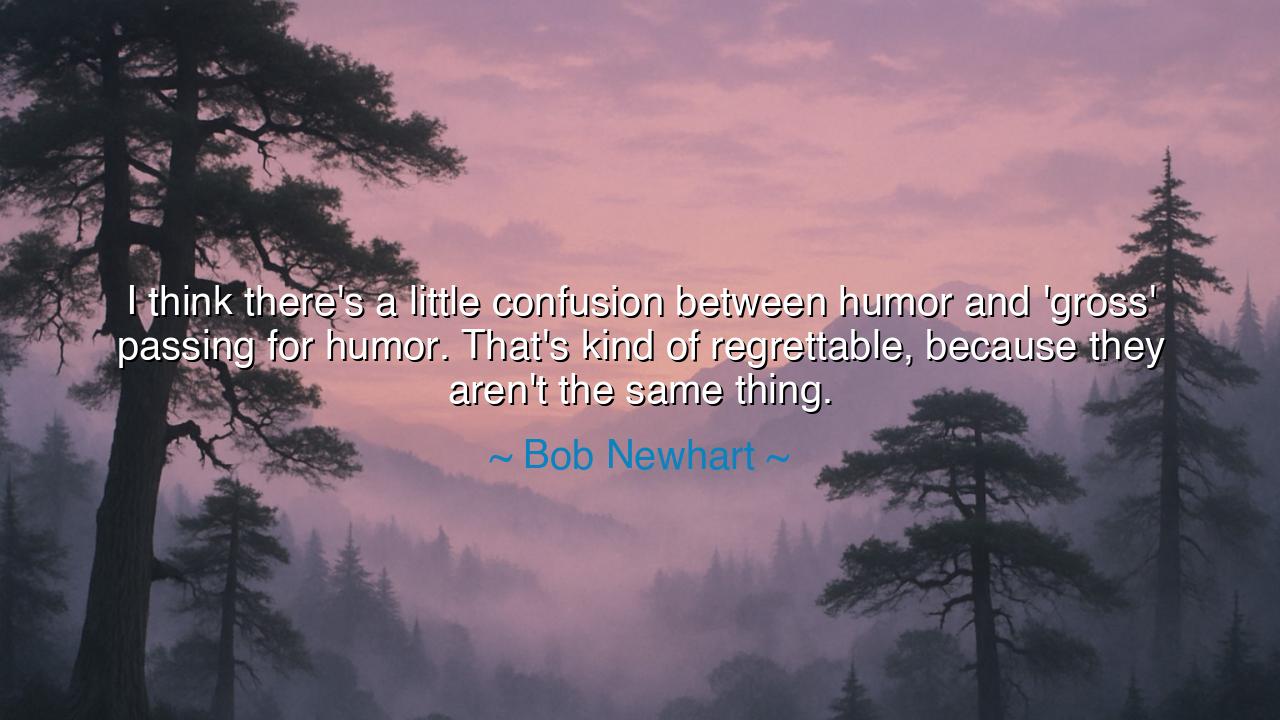
I think there's a little confusion between humor and 'gross'
I think there's a little confusion between humor and 'gross' passing for humor. That's kind of regrettable, because they aren't the same thing.






When Bob Newhart said, “I think there’s a little confusion between humor and ‘gross’ passing for humor. That’s kind of regrettable, because they aren’t the same thing,” he was not merely lamenting the decline of taste — he was defending the soul of true comedy. In his quiet, measured way, Newhart spoke as a sage of laughter, one who understood that humor is not born from shock or vulgarity, but from understanding, from compassion, from the mirror of truth held up gently to the human condition. His words carry the gravity of one who has seen the art of laughter lose its refinement — where crudeness often masquerades as courage, and vulgarity pretends to be authenticity. But real humor, he reminds us, is not the destruction of dignity; it is the celebration of it.
The meaning of this quote lies in the distinction between wit and vulgarity, between laughter that enlightens and laughter that debases. True humor, as Newhart understood, is an act of creation, not of destruction. It brings light into the human heart — it reveals truth, comforts sorrow, and reminds us of our shared absurdities. But “gross” humor, the kind he warns against, is born not from insight but from laziness; it seeks to provoke without purpose. It replaces intelligence with impulse, replacing depth with shock. Such laughter is hollow — it fades quickly, leaving behind no warmth, no wisdom, no connection. The great comedians, like the great philosophers, understood that laughter is sacred: it is a bridge between minds and souls, a balm for human imperfection.
In the ancient world, humor was seen as a divine gift. The Greeks believed that laughter was not simply entertainment but a form of knowledge — a way of perceiving the ironies and contradictions of life without despair. The philosopher Aristotle wrote that true comedy is the imitation of what is inferior, yet without malice; it allows people to see their flaws and still love themselves. The moment laughter becomes cruel or crude, it ceases to elevate and begins to corrupt. What Newhart expresses echoes this wisdom: that humor, when stripped of grace and intelligence, loses its moral purpose. The gross laugh, born from vulgarity, may amuse for a moment, but it cannot heal, cannot teach, cannot endure.
Consider the example of Charlie Chaplin, whose films made the world laugh even in its darkest times. Chaplin never relied on vulgarity or shock — his comedy was simple, universal, and deeply human. In Modern Times, he mocked the dehumanizing machinery of the industrial age, not through obscenity, but through innocence — through the image of a man caught in the gears of progress, still smiling. His humor made the world see itself with compassion, not contempt. This is what Bob Newhart meant by true humor: laughter that reveals rather than ridicules, that brings humanity closer together instead of tearing it apart. Chaplin’s art endures because it respected both its audience and its subject; “gross” humor, by contrast, dies quickly, for it disrespects both.
Newhart’s own style of comedy reflects this same principle. His famous monologues — the hesitant phone calls, the awkward conversations, the gentle absurdities — never relied on profanity or shock. They drew laughter from recognition: from the quiet absurdities of everyday life. His was the humor of subtlety, of intelligence, of restraint. He proved that laughter need not be loud to be powerful, nor crude to be real. His art was born from empathy, from seeing humanity in all its awkwardness and choosing to smile rather than sneer. And in that simplicity lies a timeless truth: that the purest laughter arises from love, not mockery.
Yet, as Newhart observed, the world often forgets this. In an age that prizes immediacy, “gross” humor thrives because it is easy — it shocks rather than engages, it provokes rather than connects. But true humor, like wisdom, requires patience. It is not a hammer, but a lantern. It does not batter the world into submission; it illuminates it. The laughter born from cheapness fades like smoke, but the laughter born from truth endures like a flame. Newhart calls us, then, to reclaim the dignity of comedy — to remember that laughter, at its best, is an act of generosity, not aggression.
So, my listener, take this lesson to heart: seek the laughter that uplifts, not the laughter that degrades. Do not confuse volume with value, nor shock with substance. When you make others laugh, let it be through insight, not insult; through understanding, not obscenity. Speak with intelligence, for humor born from wit sharpens the mind, while humor born from vulgarity dulls the soul. The world already has enough darkness — let your laughter bring light.
For in the end, Bob Newhart’s words are not just a defense of comedy, but a defense of humanity itself. Humor, at its highest form, is the language of mercy — it teaches us to face our flaws without losing our grace. To laugh well is to live wisely, and to make others laugh well is to love deeply. So laugh, but laugh with heart. Create, but create with care. For when humor honors the dignity of the human spirit, it becomes more than amusement — it becomes art, truth, and light everlasting.






AAdministratorAdministrator
Welcome, honored guests. Please leave a comment, we will respond soon